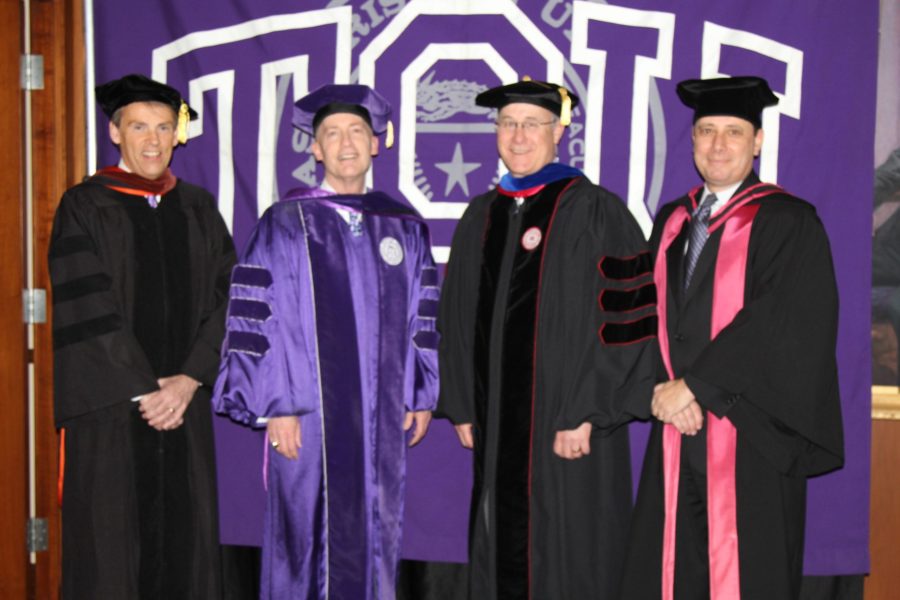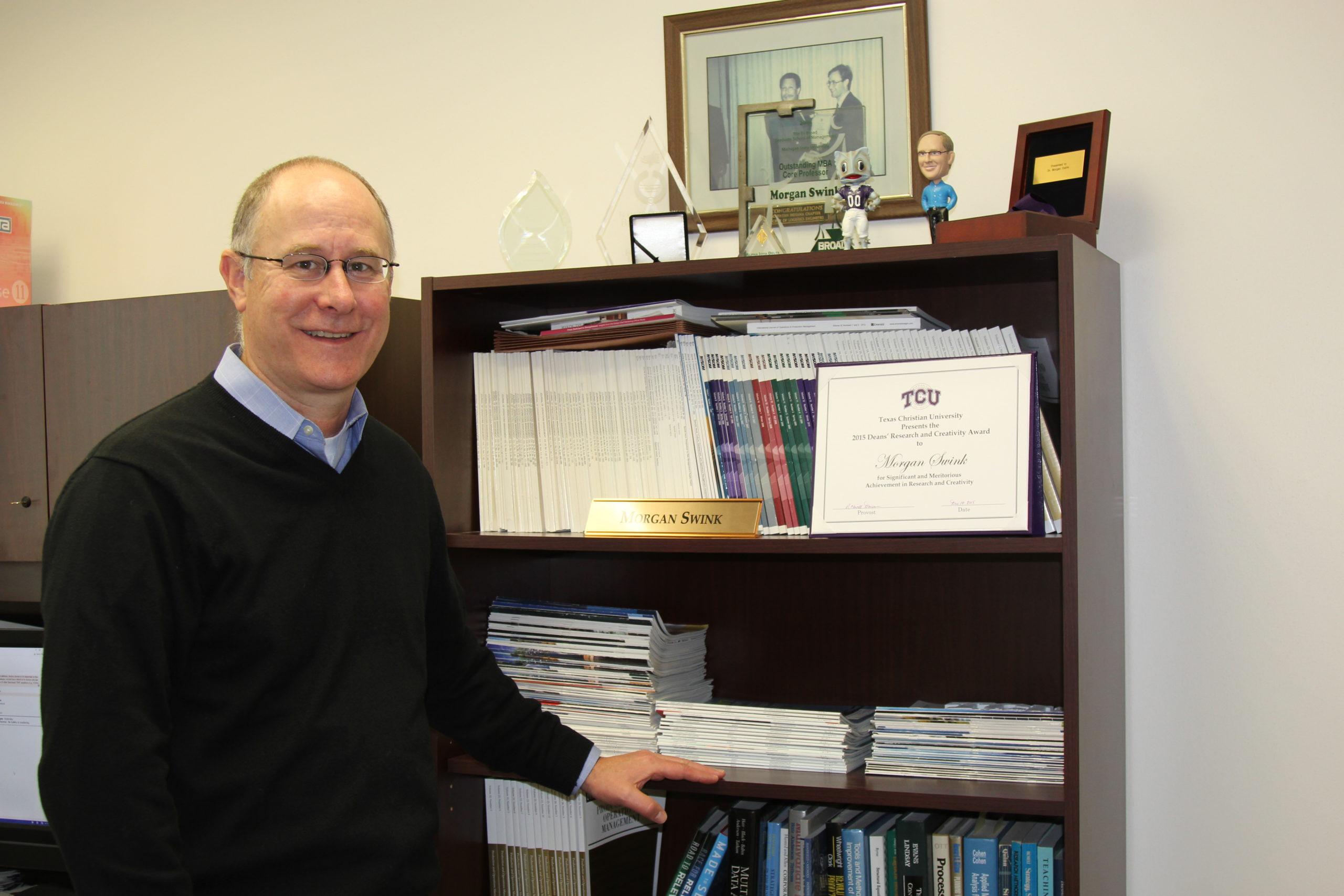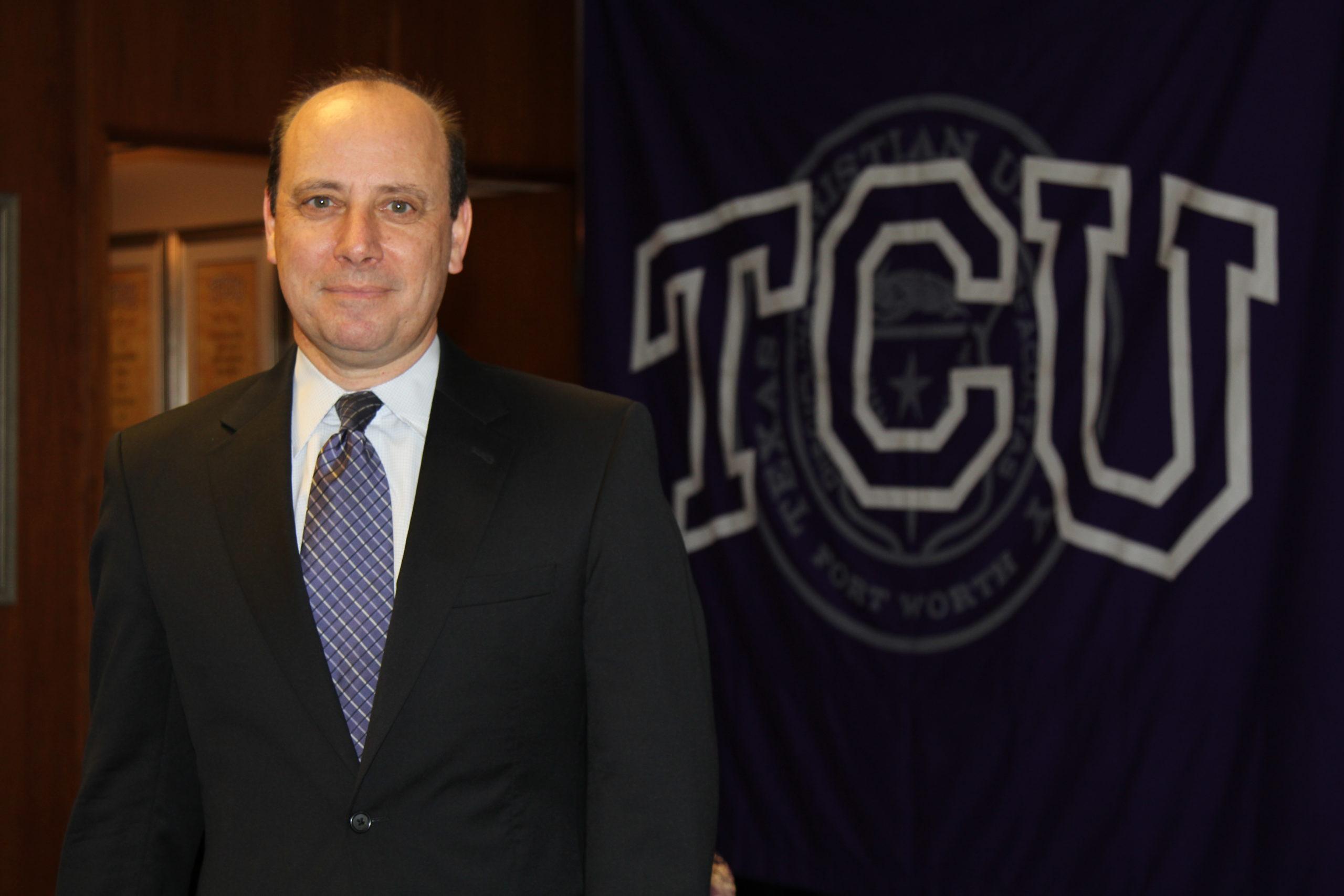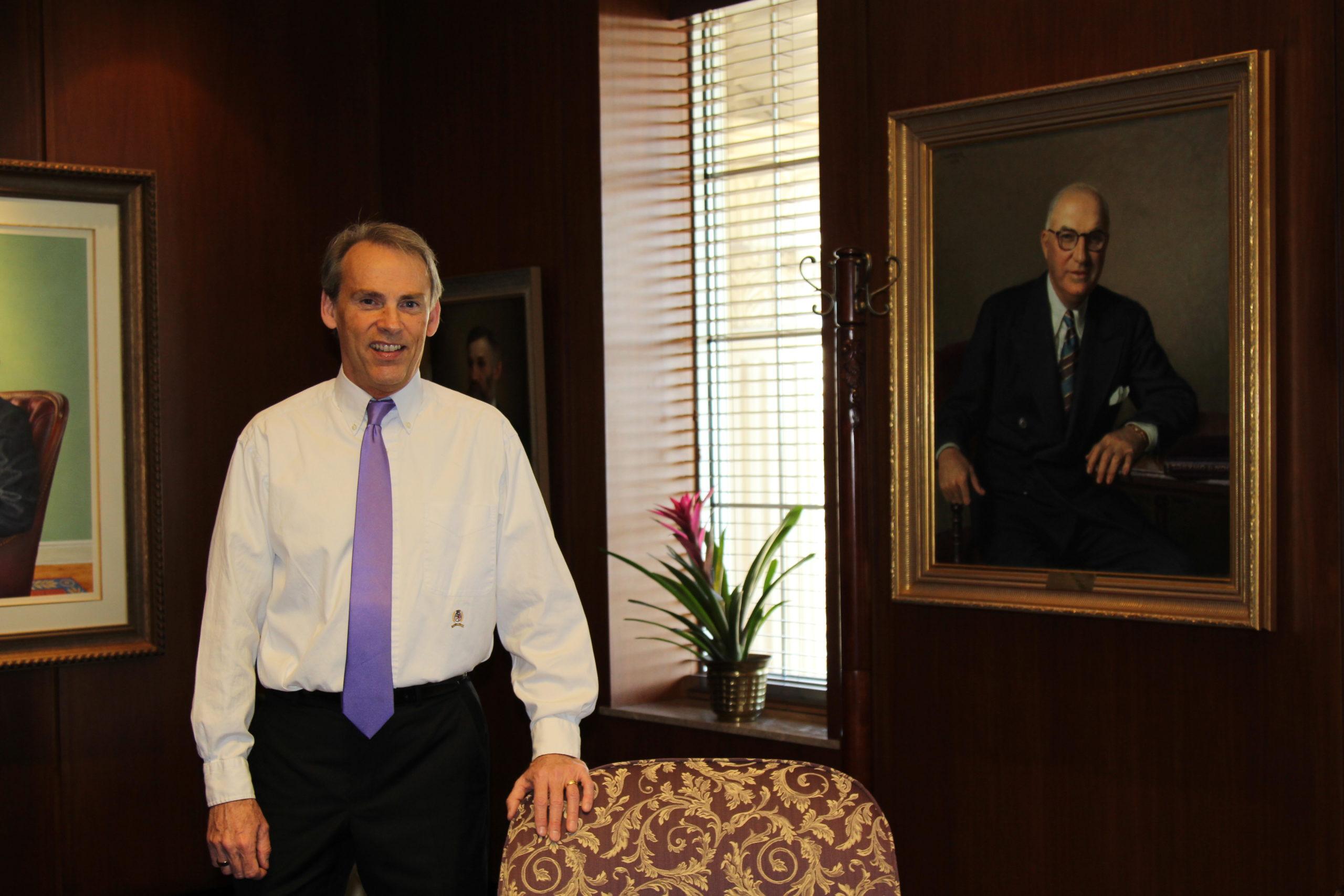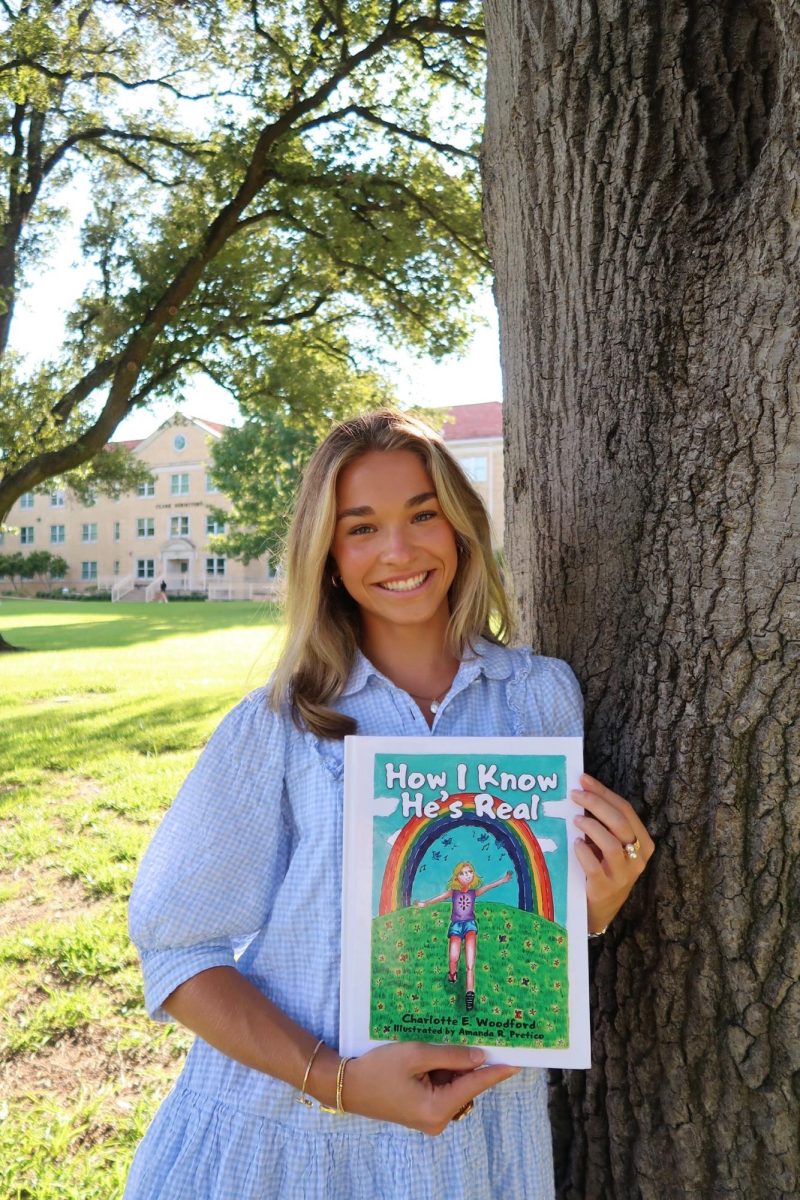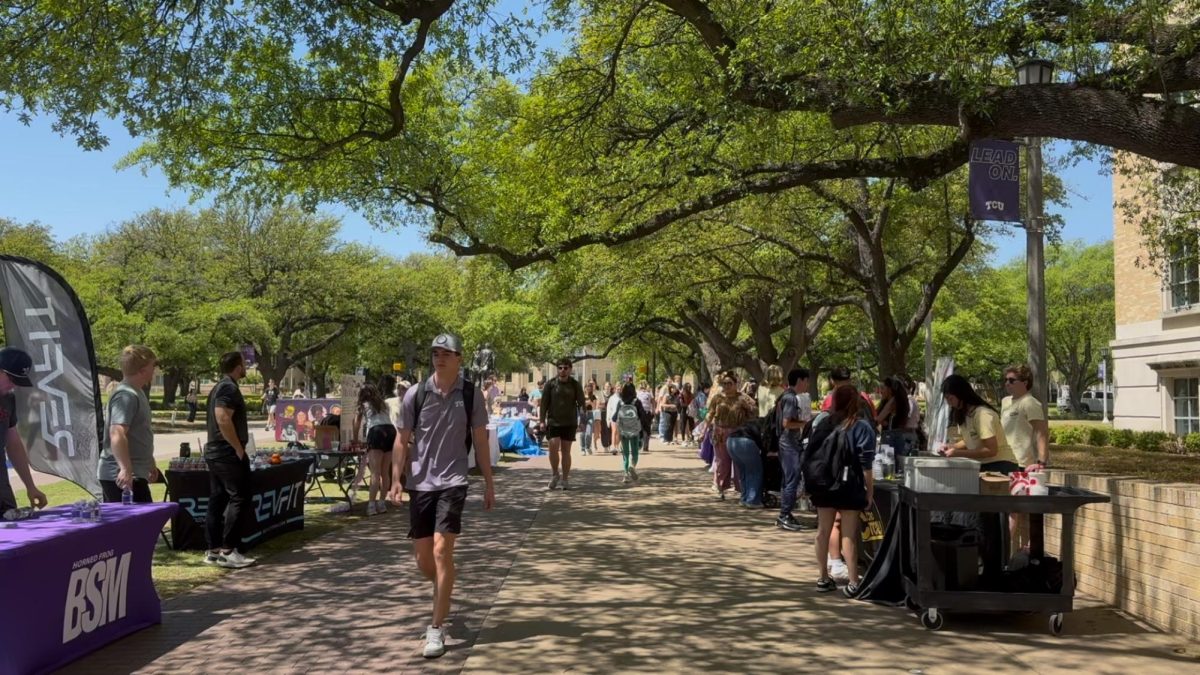One professor looks for solutions in supply chain management, another specializes in foreign exchange rates and capital flows, a third studies how a new religious movement spreads.
Different interests, but all three professors have one thing in common: the Deans’ Research and Creativity Award.
John T. Harvey, AddRan College of Liberal Arts; Darren Middleton, AddRan College of Liberal Arts; and Morgan Swink, Neeley School of Business each won a $2,500 award for producing the highest quality research and creative activity over the last several years.
The award was presented at the fall commencement on Dec. 19.
TCU 360 reached out to the three professors and asked about their respective passions.
Dr. Morgan Swink is the Eunice and James L. West chaired professor of supply chain management in the Neeley School of Business, where he also serves as the executive director of the supply and value chain center.
Can you please describe your research?
Key research questions address how to effectively manage innovation projects and programs. My co-authors and I have addressed both technical and behavioral aspects of innovation project management through studies of project teams and work environments, as well as financial evaluations of the real, measurable impacts of innovation strategies and programs.
What was one of the most interesting things that you discovered through your research?
Key findings are that heavy investments in innovation leadership (both product and process) carry substantial risks as well as rewards. Market and industry contexts heavily influence the returns of being a leader (heavy investor or early adopter) or follower (low investor or late adopter) in product innovation (e.g., R&D, patents) and/or process (e.g., six sigma) innovations. At a more granular level, our research has explored behavioral elements such as intellectual capital, psychological safety, priorities, and monitoring regimes on innovation project performance.
What is the most rewarding part of your research?
Discovering answers to important questions gives me a sense of accomplishment. I also very much enjoy meeting people in business and learning about their specific industries, challenges, and opportunities.
What prompted your research in this area?
I started my career with Texas Instruments in product development and manufacturing roles. This was a project oriented environment, and I have always liked working on projects, especially projects that have innovation as a key objective.
Are you continuing your research or have you started to investigate something else?
Yes, I’m continuing on with the study of innovation, with a particular focus on technologies that can be used to improve supply chain management (robots, drones, artificial intelligence, big data, etc). It is an exciting area to research because there are so many new technology areas that have great promise for major impacts.
Dr. Darren Middleton is a professor of religion. Middleton also serves as Honors Faculty Fellow in the John V. Roach Honors College.
Can you please describe your research?
Recent research has involved collaborative as well as solo projects. Last year’s monograph investigates how the arts (music, literature, painting, film) serve as the primary mechanism for the global spread of the Rastafari religious movement’s message. Also, I edited an anthology of interdisciplinary essays with Dr. Mark Dennis, a TCU colleague, on a novel by Shusaku Endo, a Japanese Roman Catholic writer of the last century. Dr. Dennis and I were fortunate to include a contribution from Martin Scorsese, who will release a film version of Endo’s novel later this year.
What was one of the most interesting things that you discovered through your research?
I discovered that ethnographic work, which involves studying things like “lived religion,” or people as they actually think and act on the ground, is labor— and time—intensive, though very much worth the effort. My wife, Dr. Betsy Flowers, an American religious historian at TCU, has forgotten more than I’ll ever know about ethnography. She once taught me that ethnography reveals how folk on the ground are often more complicated than scholarly theories suggest. She’s right. I often sensed delight and frustration with the sheer varieties of Rastafari in our world, from Zen Buddhist Rasta in Kyoto to Muslim Rasta in Dakar.
What is the most rewarding part of your research?
Research enables me to take delight in practicing as well as cultivating at least two scholarly habits. The first habit is “mental migration,” a term I am taking on loan from Dr. Andy Fort, another TCU colleague, and this phrase signifies the challenge of learning how to travel, in the mind’s eye, over different territories of thought. The second trait is “informed empathy,” which involves understanding one’s subject or, as Elvis Presley once said, “walking a mile in someone’s shoes”!
What prompted your research in this area?
I think it all returns to a simple curiosity about the world around me, especially concerning those who seem “other” or “different” to who I imagine myself to be.
Are you continuing your research or have you started to investigate something else?
I am in the early stages of something else, something that challenges me, and that’s contemporary American evangelicalism. In particular, I am working with my wife on a volume of essays devoted to telling the history of the Evangelical Novel. Believe it or not, I’m listening to a lot of Johnny Cash, one of my heroes because he wrote a popular novel about the Apostle Paul. Our 11-year-old son would rather I play The Weeknd during our commute to school every morning but, really, I think he’s getting a much richer take on the world from that latter-day prophet we call The Man in Black!
Dr. John T. Harvey is a professor of economics. Harvey also serves as the editor of the World Economic Review.
Can you please describe your research?
My main area of research is discovering what determines exchange rate movements. I’ve written a number of articles and one book on the subject and I teach a course on this in our program (International Monetary Economics).
What was one of the most interesting things that you discovered through your research?
The importance of psychological factors in both the currency market and in creating macroeconomic expansions and recessions. I knew these were issues but didn’t realize their importance until I built a computer model of the business cycle some years ago. It really didn’t work until I let people’s swings between optimism and pessimism play a larger role (especially in the particular manner described by John Maynard Keynes). It caused me to shift my thinking, which shows how valuable modeling a phenomenon can be.
What is the most rewarding part of your research?
First and foremost, it’s fun! There’s no way a person could force themselves to sit and read and write for hours on end if they didn’t enjoy it. On top of that, I think economics is very important. Economic theory plays a far more important role in how people have to live their lives than they realize and so it’s vital to get it right.
What prompted your research in this area?
Even though I grew up in the US, I was born in London. For that reason, I’ve always been very interested in international issues (political and economic). But, not exchange rates, per se, at first. My initial area of research interest was multinational corporations. Then, back in the late 1980s, I was doing a study on multinationals and was very interested in the fact that one of the variables that turned out to be important was exchange rate fluctuation. I thought that the existing theories of exchange rate determination weren’t very good, and so I shifted my research towards that.
Are you continuing your research or have you started to investigate something else?
I have recently shifted a bit from exchange rates to business cycles. I’ve written a few papers both describing events in the US and building models, but I’m really ready now to do something in book form. I have a sabbatical coming up in spring 2017 and my goal is to come out of that with at least the foundation of a volume on business cycles in the US since the end of World War Two. Surprisingly, this is an area that has become ignored. I think that events like the Financial Crisis should lead us to want to understand more about expansions and recessions.
An individual college at TCU can submit one candidate and AddRan College of Liberal Arts is eligible to nominate two candidates from social sciences and humanities disciplines.
Nominations from each college have to be submitted to Provost Nowell Donovan before Nov. 10.
To obtain more information about the guidelines for the Deans’ Research and Creativity Award, please click here.

